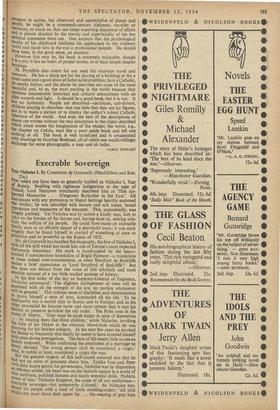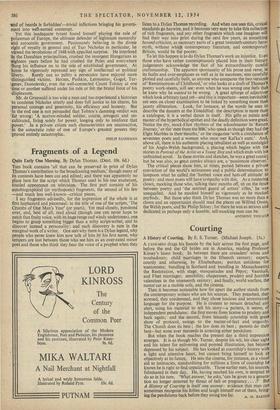Execrable Sovereign
rEw rulers can have been so generally loathed as Nicholas I, Tsar nj Russia. Swelling with righteous indignation at the rape of ,rOland, Lord Tennyson trenchantly described him as 'This icy- nearted Muscovite . . . O'crgrown Barbarian in the East.' All Europeans with any pretension to liberal leanings heartily endorsed the verdict; he was identified with knouts and salt mines, brutal repression and massacres of the innocent. This, undoubtedly, was largely justified. Yet Nicholas was by nature a kindly man, loth to take on the burden of the throne and, having done so, seeking wist- fully the welfare of his people. He could have made an estimable family man or an efficient mayor of a provincial town; it was stark tragedy that he found himself in control of something at once so primitive and so powerful as the Russia of 1825.
.Mr. de Grunwald has handled this biography, the first of Nicholas I, With all the skill which has made him one of Europe's most respected dint° natic historians. His work is handicapped by the heavy- Handed if conscientious translation of Brigid Patmorc—a translation at times indeed over-conscientious, as when Stratford de Redcliffe make; a brief appearance as 'Lord Stratford of Redcliffel But this does not detract from the value of this scholarly and most sensible account of a too little studied passage of history. In his first order of the day as inspector-General of Engineers, Nicholas announced: 'The slightest infringement of rules will be Punished with all the strength of the law, no pardon whatsoever Will be granted.' This ruthless sense of discipline, and determination
t()
Prove himself a man of iron, dominated all his life. To be
Placable was a sacred duty to Russia and to Europe; and as his reign proceeded he became more and more certain that it was his destiny to preserve inviolate the old order. The Poles rose in the name of' liberty. 'They must be made happy in spite of themselves • • •
by treating them like blind children,' wrote Nicholas, invoking the help of his Maker in the altruistic blood-bath which he was plain ing for his feckless subjects. In the next few years he invoked his Maker so frequently that finally he seems to have invested himself r,With semi-divine prerogatives. The facts of life meant little to one so mcki y endowed. When confirming the annulment of a marriage he firml decreed, 'The young person shall be considered a virgin.' And, in public at least, considered a virgin she was. , But the greatest tragedy of this half-crazed autocrat was that he nad not an atom of greatness about him. Unlike Ivan and Peter With their innate genius for government, Nicholas was by disposition an efficient soldier, his heart was on the barrack square in a world of trim uniforms, polished buttons and neatly executed drills. Pushkin %%TMe of him: 'Nicholas Emperor, the cause of all our misfortune— execrable sovereign—but noteworthy Colonel.' So Nicholas bur- _elle,' his people with a load of futile standing-orders: 'All civil fl1plo,ees must shave their upper lip . . . the wearing of grey hats laid of beards is forbidden'—trivial inflictions bringing his govern- ment into well-earned contempt. Yet this inadequate tyrant found himself playing the role of policeman of Europe, the ultimate defender of legitimate monarchy and autocratic government. Passionately believing in the divine right of royalty in general and of Tsar Nicholas in particular, he viewed the revolutions of 1848 with appalled surprise. He interfered In the Danubian principalities, crushed the insurgent Hungarians as eighteen years before he had crushed the Poles and everywhere flung his influence on to the side of established government. At home he vigorously repressed any sign of intellectual or political liberty. Rarely can so paltry a persecutor have enjoyed more distinguished victims. Herzen, Pushkin, Lermontov, Gogol, Tur- genev, Dostoievsky, even the well-connected Count Tolstoy at one time or another suffered under his rule or felt the brutal force of his displeasure. Mr. de Grunwald is too wise a man and too experienced a historian to condemn Nicholas utterly and does full justice to his charm, his personal courage and generosity, his efficiency and honesty. But In the end one is not persuaded that Tolstoy's damning verdict was far wrong: 'A narrow-minded soldier, coarse, arrogant and un- cultivated, living solely for power, longing only to reinforce that power.' In a private citizen such characteristics are unattractive, In the autocratic ruler of one of Europe's greatest powers they proved entirely catastrophic.
PHILIP SANDEMAN



































 Previous page
Previous page